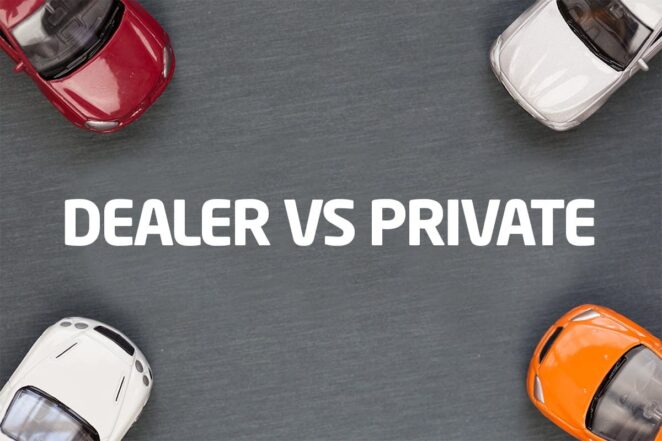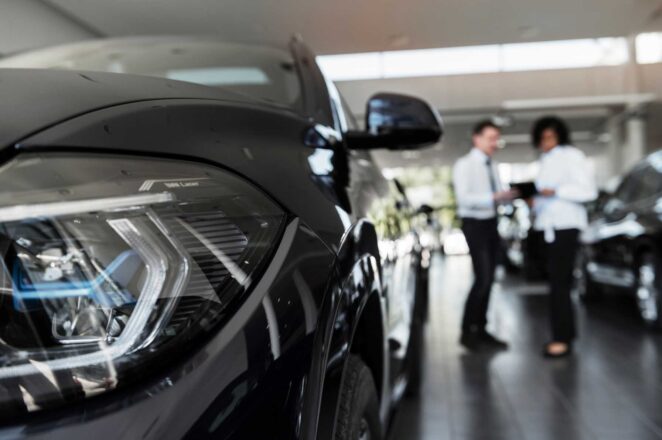Dealer or private. It’s a decision that everyone buying second-hand will have to make, at some point. However, it can also be a naturally tricky choice to make.
Certainly, it’s not easy to decide altogether which is better. In fact, both options have pros and cons.
In concurrence with this thought, today, we’re looking at whether you should buy a car from a dealer or go private; hopefully, this will help you find the right strategy for your needs, no matter what.
Always Run a Car History Check
A car history check is a simple tool. All you need is the vehicle’s number plate, and the software will bring up a wealth of information related to the history. Just a handful of the things such checks can highlight include:
- The vehicle’s details;
- Financing information;
- Stolen status;
- Write-off history;
- MOT history;
- And more.
Dealer vs Private — Which is Best Suited for Car Purchases

Professional car dealers and private sellers both offer a potentially good opportunity when buying second-hand. That said, there’s no way to say for certain which will be right, which is where considering the pros and cons may help inform your decision.
The Benefits of Buying Privately
There are many benefits associated with private sales. Of course, from the seller’s perspective, this can save them money; however, it also means they can potentially charge less for the car than a dealer might do. In turn, this can be a great benefit for buyers, as second-hand cars from private sellers are often cheaper.
What’s more, when buying privately, there’s much more chance you’ll get the full car history. After all, a dealer only knows so much, whereas private sellers will know both what they’ve used the car for and potentially how previous owners used it. As such, this can give a much clearer picture.
The Cons of Buying From a Private Seller
While the price might be tempting, there are several risks and challenges that can make this option less appealing.
No Warranty

Private sales typically don’t come with warranties. Once you drive the car away, any problems that arise are your responsibility. This can be a significant risk, especially if you’re not a car expert. Without a warranty, you might face expensive repairs soon after your purchase.
For instance, if the transmission fails a week after you buy the car, you’ll have to cover the repair costs yourself. It’s crucial to have the car thoroughly inspected by a trusted mechanic before finalizing the purchase to minimize the risk of unexpected issues.
Potential Scams
Private sales can be riskier because it’s harder to verify the seller’s credibility. You might encounter scams or end up with a car that has hidden issues. Always be cautious and do thorough research before finalizing a deal.
Scammers might roll back the odometer to make the car appear less used than it really is. Some sellers might provide false documents or hide serious mechanical problems that aren’t immediately apparent.
To protect yourself, always ask for the car’s maintenance records and run a vehicle history report to check for any red flags.
Financing Challenges
Unlike dealers, private sellers usually don’t offer financing options. You’ll need to arrange your financing, which can be more challenging and time-consuming. This means you might have to shop around for a loan, which could lead to varying interest rates and terms.
Securing financing independently requires more legwork, such as visiting multiple banks or credit unions. Additionally, without dealer partnerships, you might miss out on promotional interest rates or flexible payment plans that dealers sometimes offer.
Why People Choose to Buy From a Dealer
While buying from a private seller can be cheaper (and may give more history), it’s not the perfect option. For one thing, it’s worth noting that many dealers offer the option to trade in a previous vehicle; in turn, this can allow you to exchange, or part exchange your old car for a newer version.
What’s more, when buying from a dealer, you usually get more security; many dealers will offer protections such as guarantees on the cars they sell. In turn, this can allow you more confidence in your purchase.
As such, you’ll usually pay more for a car from a dealer. Nevertheless, you should keep in mind that the extra security may be well worth considering. Plus, some dealers may do minor repairs and improvements on the car before selling it, getting it into potentially a better condition.
The Cons of Buying From a Dealer

While dealerships offer many conveniences, there are some significant drawbacks that can impact your overall buying experience and budget.
Higher Prices
Dealerships have higher overhead costs, including employee salaries, utilities, and rent. These costs are often passed on to the buyer, making cars more expensive than those sold by private sellers. As a result, you might find the same model car significantly cheaper if purchased privately.
Pressure to Buy
Dealers are in the business of selling cars, and sometimes the sales tactics can be aggressive. You might feel pressured to make a decision quickly, which can lead to buyer’s remorse if you’re not fully prepared.
High-pressure tactics can make it difficult to take the time needed to thoroughly research your purchase. This pressure can also make negotiating the price more stressful, leading you to accept a less favorable deal than you might get elsewhere.
Added Fees
When you buy from a dealer, expect to pay additional fees such as documentation fees, dealer preparation fees, and more. These can add up, making the final price significantly higher than the sticker price.
Some of these fees may seem hidden or only appear late in the buying process, catching you off guard.

Final Thoughts
Buying a new car can sometimes feel overwhelming. However, if this choice has left you feeling unsure, don’t fret. There’s a simple way to add a little more confidence to your decision: running a car history check.
This information can help you make a more informed decision for your purchase. So, regardless of whether you buy from a dealer or privately, running a check could help give you more confidence.



